10 Worst flood in US history - What lessons we can learn from disasters
The United States has experienced many floods annually. These floods cause catastrophic damage in loss of life, property, and financial losses. Looking back top 10 worst flood in US history below to see the devastating power of nature as well as the wonderful recovery of the damaged states.
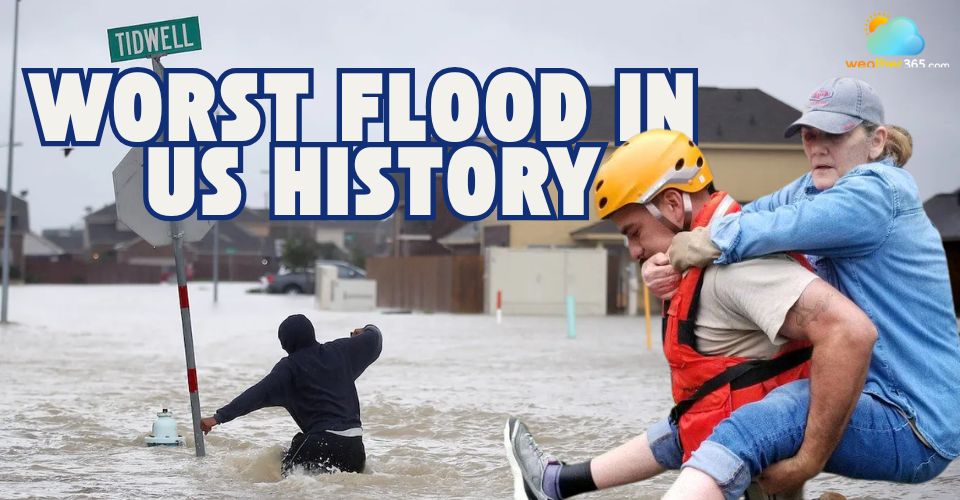
Top worst flood in US history
- 50 States have experienced devastation due to floods
- Types of floods
- TOP Worst Flood in US History: Coastal floods
- Galveston Island Storm, 1900
- Sea Islands Hurricane
- Hurricane Katrina
- TOP Worst Flood in US History: River floods
- Johnstown Flood
- Great Ohio Flood
- The Great Mississippi River Flood
- TOP Worst Flood in US History: Flash floods
- Lake Okeechobee Flood
- St. Francis Dam failure
- Heppner flash flood
50 States have experienced devastation due to floods
All 50 states in the U.S. have experienced economic losses due to flooding, making it a widespread and costly natural disaster.
According to National Geographic, the largest floods in American history cause about $6 billion in damages annually.
For example, the August 2016 floods in Louisiana resulted in around $10 billion in damage, with 80% of affected homes lacking flood insurance.
Flooding is not limited to coastal areas; inland regions near rivers, dams, and new developments also face significant risks.
The Mississippi River has been responsible for some of the deadliest and most expensive floods in the country.
Climate change is intensifying the problem, with a 20% increase in heavy rainfall over the past 50 years and more frequent hurricanes causing severe flooding.
Experts estimate that floodplain areas in the U.S. could expand by 40 to 45% in the next century, increasing the number of people and properties at risk.
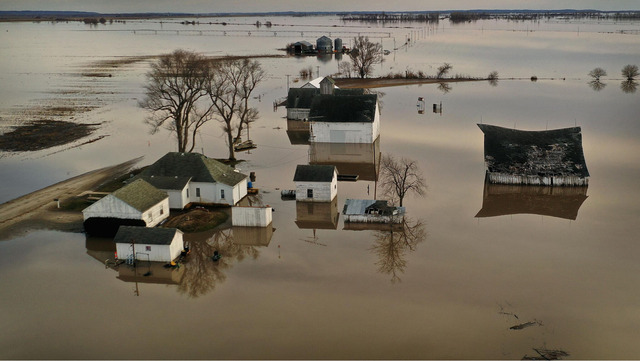
50 States have experienced devastating damage due to floods
Types of floods
Floods are divided into 3 main types: Coastal floods, river floods, and flash floods.
-
Coastal floods( another name: storm surges): Happen when high tides combine with powerful storms like hurricanes or tsunamis, pushing large volumes of water onto the shore.
-
River floods( another name: fluvial floods): Happen when rivers or lakes overflow their banks due to heavy rainfall or snowmelt, flooding nearby land.
-
Flash floods (another name: pluvial floods): Happen when intense rainfall causes flooding. They can occur anywhere, including cities where drainage systems or dams fail.
Weather365 gave definitions of 3 types of floods and then listed the top worst flood in US history based on those 3 types.
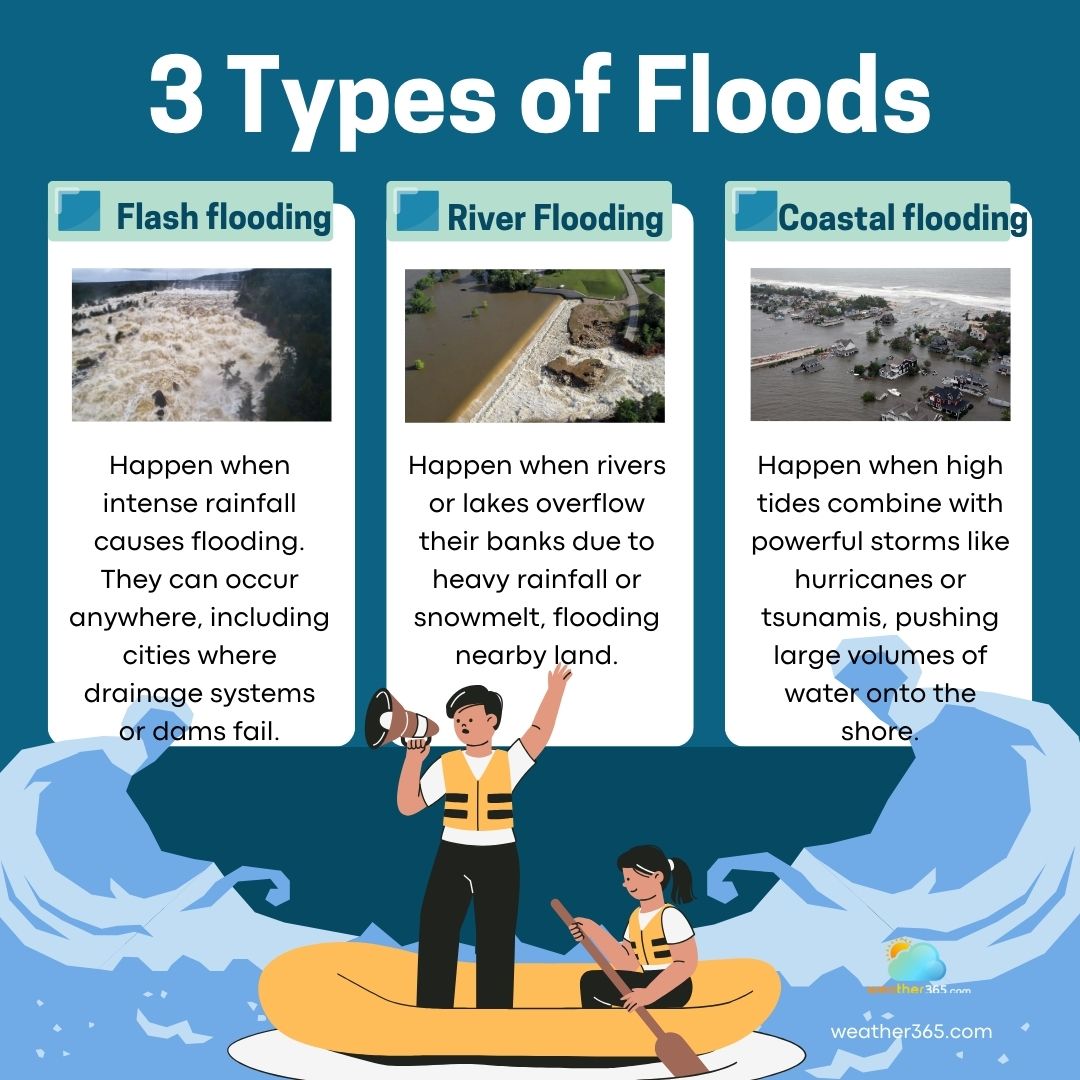
Three types of floods
TOP Worst Flood in US History: Coastal floods
The worst coastal floods in the US primarily is due to hurricanes.
Galveston Island Storm, 1900
-
Time: 1900
-
Affected area: Galveston, Texas
-
Deaths: 8000
-
Damages: $602.3 million
The flood in Galveston in 1900
On September 8, 1900, a powerful Category 4 hurricane struck Galveston Island, Texas. The storm brought a devastating 15-foot storm surge that flooded the island, destroying thousands of homes and businesses.
The disaster left an estimated 8,000 people dead (about 20% of the Galveston population) and around 10,000 homeless.
Property damage, adjusted for inflation, reached approximately $1.25 billion.
The hurricane remains the deadliest natural disaster in U.S. history, with many victims drowning or crushed by debris.
The storm also exposed the lack of effective early warnings at the time, contributing to the high death toll.
In response, Galveston later built a seawall and raised the island’s elevation to protect against future storms.
Sea Islands Hurricane
-
Time: 1893
-
Affected area: Sea Islands
-
Deaths: 2,000+
-
Damages: $27.9 million
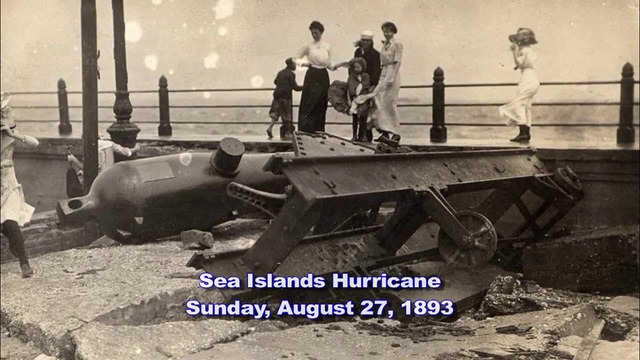
The Sea Islands hurricane in 1893
In August 1893, a Category 3 hurricane struck the Georgia and South Carolina coastlines, causing a devastating storm surge that heavily damaged the Sea Islands and nearby peninsulas.
Approximately 2,000 people drowned, and nearly all buildings on the islands were destroyed, leaving thousands homeless.
The recovery and rebuilding efforts lasted about 10 months and cost around $23 million(adjusted for inflation).
Hurricane Katrina
-
Time: 2005
-
Affected area: Southern Louisiana
-
Deaths: 1833
-
Damages: $103.9 billion
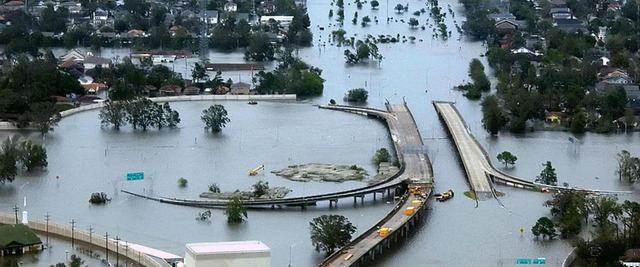
The hurricane Katrina caused flood in 2005
On August 29, 2005, Hurricane Katrina struck New Orleans, causing catastrophic damage and becoming the costliest hurricane in U.S. history with $108 billion in losses and 1,833 deaths.
The city’s sinking below sea level and a failing levee system allowed a massive storm surge to flood 20% of New Orleans.
Many vulnerable residents, especially those living in poverty, struggled to evacuate. Floodwaters took over a month to be fully pumped out, and the city’s population has yet to recover to pre-Katrina levels.
The city strengthened levees, improved floodwalls, and upgraded pumping systems to prevent future floods.
Emergency planning and early warning systems were also enhanced to better protect residents.
Read more:
Which us state often have flood
Worst Floods in History
TOP Worst Flood in US History: River floods
These are the worst river floods in American history, mostly brought on by massive rainfall that overwhelms dams and inland infrastructure.
Johnstown Flood
-
Time: 1889
-
Affected area: Johnstown, Pennsylvania
-
Deaths: 2209
-
Damages: $12.6 billion
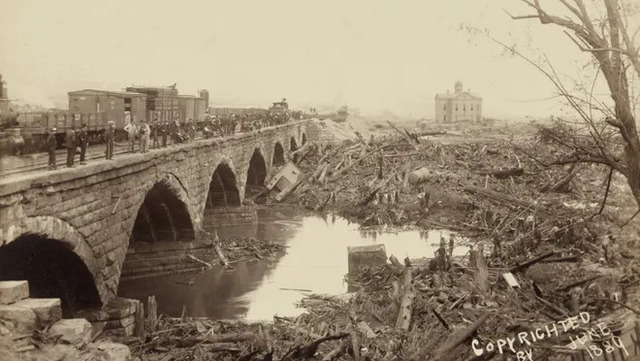
The Johnstown flood in 1889
On May 31, 1889, the South Fork Dam near Johnstown, Pennsylvania, burst after heavy rainfall. It released 3.8 billion gallons of water into the town.
Due to confusion and false alarms, residents were not warned in time to evacuate.
The flood carried debris, including trees, houses, and heavy locomotives, destroying four square miles of Johnstown.
The flooding disaster killed 2,209 people and caused $17 million in property damage.
Despite the destruction of 1,600 homes and major businesses, the community gradually rebuilt, with industries like Cambria Iron returning to full production within 18 months.
The disaster also led to changes in liability laws and inspired the establishment of memorials commemorating the event.
Great Ohio Flood
-
Time: 1913
-
Affected area: Ohio
-
Deaths: 428
-
Damages: $3 billion
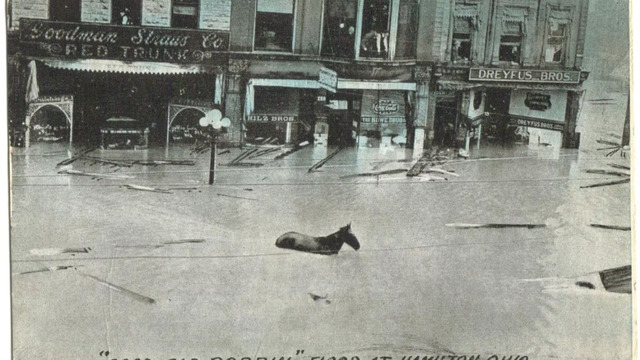
Great Flood in 1913
In March 1913, Ohio experienced a devastating flood caused by early snowmelt and relentless heavy rain over several days.
Rivers swelled, and floodwaters in Dayton reached 20 feet, destroying 20,000 homes and causing widespread damage.
The disaster claimed 428 lives and resulted in approximately $3 billion in damages (adjusted for inflation). It becomes one of the state's most severe weather events.
The Great Mississippi River Flood
-
Time: 1927
-
Affected area: Missouri, Illinois, Kansas, Tennessee, Kentucky, Arkansas, Louisiana, Mississippi, Oklahoma, and Texas.
-
Deaths: 250
-
Damages: $5 billion
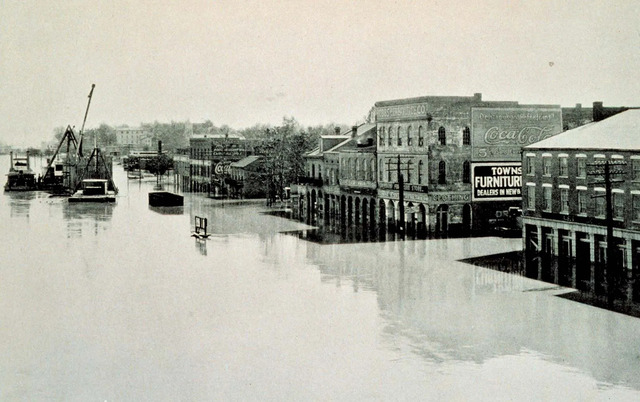
The Great Mississippi river flood in 1927
In the spring of 1927, the greatest river flood on record struck the Mississippi River system from Illinois to Louisiana.
Excessive rainfall caused the levee system to fail, flooding surrounding communities.
The disaster killed 250 people, displaced thousands, and left around 750,000 without food or water.
Property damage was estimated at $5 billion (adjusted for inflation), with economic losses equal to about one-third of the federal budget at the time.
The disaster prompted major changes in flood control policy, leading to the 1928 Flood Control Act, which authorized the construction of stronger levees, floodways, and reservoirs to better manage the river and prevent future catastrophes.
TOP Worst Flood in US History: Flash floods
Flash floods can be caused by any combination of factors, not necessarily stemming from a river or lake. Here are the worst flash floods in US history.
Lake Okeechobee Flood
-
Time: 1928
-
Affected area: Lake Okeechobee, Florida
-
Deaths: 2500
-
Damages: $1.7 billion
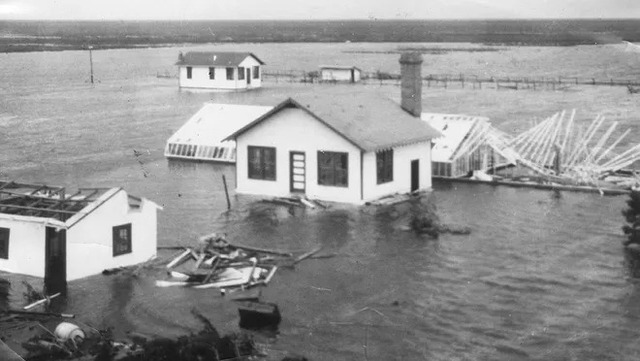
The lake Okeechobee flood in 1928
In September 1928, a hurricane struck South Florida, causing the dam holding back Lake Okeechobee to fail and flood nearby farm communities.
The disaster killed around 2,500 people, making it one of the deadliest hurricanes in U.S. history.
Combined with the onset of the Great Depression, the region struggled to recover, and Florida’s population declined by 1.5 million by 1930.
Also read:
St. Francis Dam failure
-
Time: 1928
-
Affected area: Los Angeles, California
-
Deaths: 400 - 600
-
Damages: $291.8 million
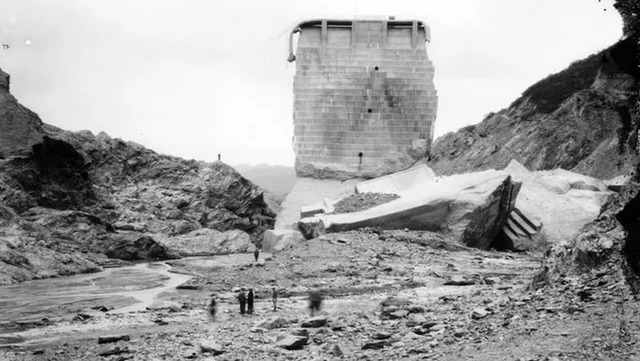
The ST.Francis dam failure
Built in 1926, the St. Francis Dam was a concrete gravity dam designed to supply water storage for Los Angeles.
Its designer, William Mulholland, a self-taught engineer, is believed to have made critical mistakes that contributed to the dam’s failure.
On May 12, 1928, just hours after its final inspection, the dam collapsed, causing a devastating flood that killed 432 people and cost hundreds of millions.
This event is regarded as the worst engineering disaster of the 20th century.
Heppner flash flood
-
Time: 1903
-
Affected area: Heppner, Oregon
-
Deaths: 324
-
Damages: $19.5 million
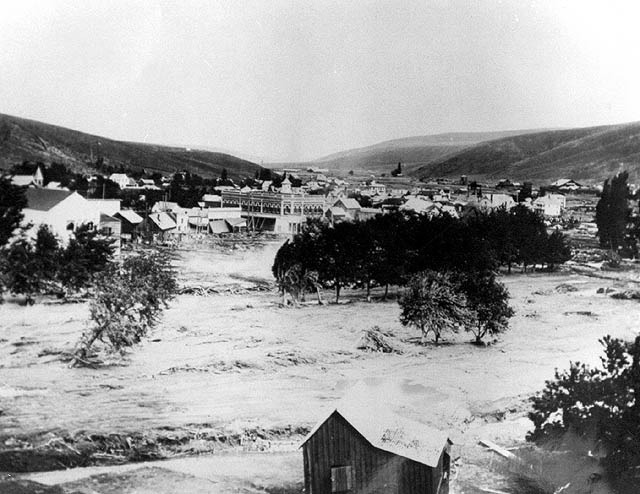
Heppner flood in 1903
On June 14, 1903, sudden heavy rains in Oregon triggered one of the worst flash floods in U.S. history.
Rivers quickly overflowed, carrying mud, debris, and uprooted trees through a narrow canyon.
A temporary debris dam briefly held back the floodwaters, but when it gave way, a massive wall of water swept through Heppner, Oregon, destroying much of the town and killing 247 people.
Today, the Army Corps of Engineers’ Willow Creek Dam protects Heppner from similar disasters.
Conclusion
Worst flood in US history happened long ago, causing many deaths due to old, less exact forecasting technologies. Nowadays, modern technology can provide earlier and more accurate weather forecasts. People have more time to prepare and evacuate when necessary, thus limiting casualties.
Một Số Câu Hỏi Thường Gặp
Realted post
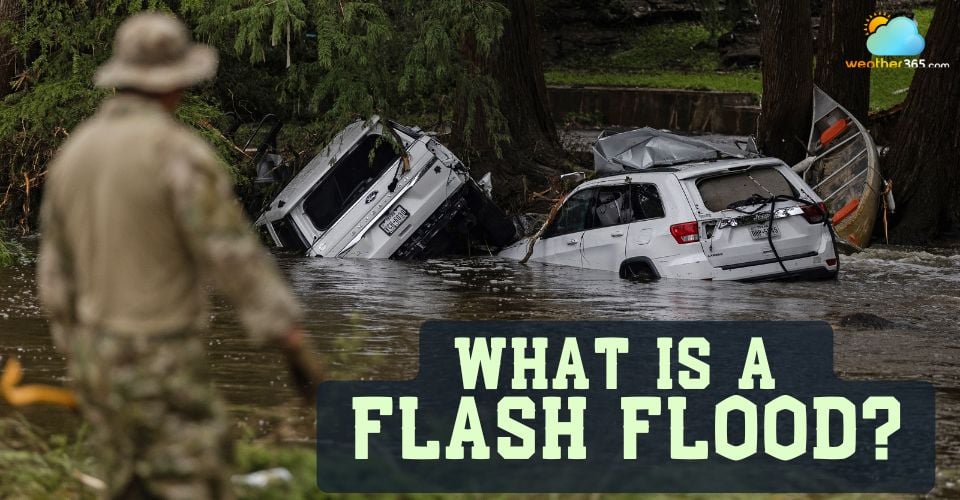

0 Comment
Leave a comment
Your email address will not be published. Required fields are marked *